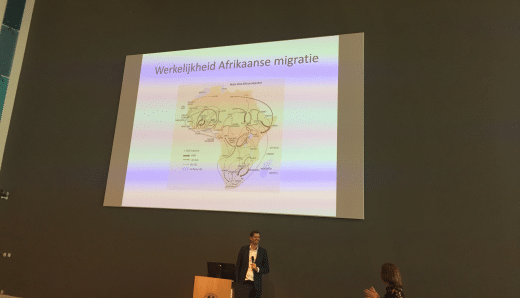Almost all NOS correspondents are back in the Netherlands for a while. This includes Bram Vermeulen: NOS correspondent, NRC journalist and creator of the series The Trek for VPRO. An ideal opportunity to speak to him once, they thought at the Ministry of Foreign Affairs. So last Tuesday (22 May), they organised a special lunch lecture with Bram Vermeulen and the ministry's Special Envoy for Migration, Marit Maij.
Counter-terrorism and migration mitigation: can they work together?
Using his own journalistic images, Bram painted a good picture of the situation in the Sahel. For instance, he has been to Mali and Niger many times. In the Sahel, Dutch and European policy is twofold: on the one hand, we try to fight terrorism there, but we also try to limit migration from these countries towards Europe. According to Bram, this clashes. For instance, many Malians think: "if our security is not increasing, why are all these Western soldiers there?" In Mali, there is a perception among many that they, mainly the French, are mainly there to take resources away from the country.
In Agadez, Niger, where Bram was among others for The Trek, another problem prevails. ECOWAS states have a high degree of freedom of movement, but to combat human smuggling, the Niger government has decided to ban travel within Niger with the aim of going to Libya. Police in the country are getting help, in the form of training, from European countries in this regard. One consequence, however, is that people smugglers with their full cars no longer take the normal road, a road with several points for water, food and petrol, but choose a route straight through the desert. It is therefore common for migrants to be abandoned in the desert, resulting in deaths.
What to do about youth?
Another important question is: what should we do with youth in these countries? In Niger, women still have an average of eight children. And although Europe has big plans for the country - 400 million euros have been promised for employment projects - only a small part of this amount, 0.5 million, has actually been disbursed, according to the Clingendael Institute.
On 18 April 2015, a ship with more than 700 migrants on board sank in the Mediterranean Sea, of whom only a small number survived. The migrants included many sons from the Senegalese village of Tambacounda. Bram talked to fellow villagers in the village. On arrival, he immediately noticed that a number of houses were made of stone: these were the homes of (relatives of) migrants. Men there were told, "You can't get married until you've been to Europe." Many young men risk the risky crossing to Europe because their social status is "nothing" if they have not been to Europe.
"Short-circuiting mutual understanding": what can we change?
A well-known drawback of largely closing borders is that migrants who have entered Europe do not return. Seasonal migration, in which migrants regularly return to countries of origin, becomes impossible as a result.
Bram also speaks of a "short circuit in mutual understanding". In the West, we talk about a "migration crisis", while in Senegal they talk about "ambition and progress". There seems to be little understanding of each other's views. In addition, in countries like Senegal, there is often a feeling that "Europe no longer wants us, whereas they used to need us badly".
A real solution also remains, as naturally expected, a long way off. However, Bram continues to argue that we need to change our use of language. The migration crisis is about people dying at sea. Migrants will always seek 'progress and ambition'. Legal migration should therefore be given a more prominent place in today's migration debate.
Want to know more? Then watch the four-part series The Trek back here. Also, the entire lunch lecture can be found on the "Netherlands and Africa" Facebook page.





